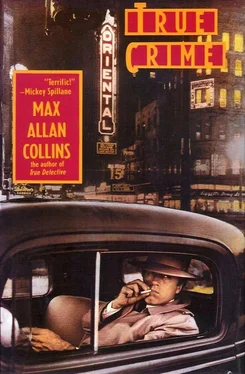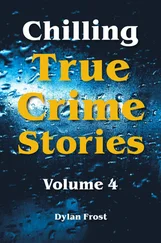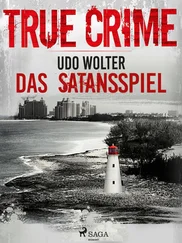Eventually the story did float (just as Probasco’s “suicide” did) and virtually everybody turned state’s evidence in return for probation, with only Piquett actually standing trial, and he was found not guilty, since the jury felt he was just an attorney trying to help a client, Dillinger.
Whoever it was that was murdered at the Biograph that hot Sunday night ended up being buried at Crown Hill Cemetery in Indianapolis on the Wednesday after. This time the crowd of morbids was chased away by God — a thunderstorm beat down on the graveside ceremony, lightning and thunderclaps overseeing the casket’s entry into ground that also held the remains of President Benjamin Harrison, several U.S. vice presidents, several Indiana governors, novelist Booth Tarkington, poet James Whitcomb Riley and the inventor of the machine gun, R. J. Gatling.
A few days later, the elder Dillinger, that dirt-poor farmer, paid to have the casket uncovered. Over the casket was poured concrete mixed with scrap metal; when that had set, some earth was shoveled in. Then four concrete slabs reinforced with chicken wire were buried, in staggered intervals, over the concrete-entombed casket.
Dillinger’s father did this, he said, to prevent “ghouls” from disturbing his son’s rest.
“If they want to get him out of there,” the father said, a smile cracking his weather-beaten face, “they’ll have to blast him out.”
The old man needn’t have worried.
Nobody wanted him out of there.
2
The Farmer’s Daughter
August 24 — Sept. 1, 1934
A month later I was starting to wonder if Sally might not be right about my chosen profession. My name had been in the papers — including my address, in the News — but no business had been generated by this notoriety, not even a death threat or two from Baby Face Nelson or Homer Van Meter. All I had to show for my trouble was a few hundred bucks and the growing suspicion I was a horse’s ass.
“What good am I?” I asked her, as we lay in her soft bed, the silk sheets draped around us, Sally snuggled against me in the dark.
“You’re very good,” she said, smiling up at me.
“Don’t change the subject.”
“Do you have to be so gloomy, Heller?”
“Am I getting you down with this talk?”
She shrugged. “Not really.”
She was a better dancer than actress; I told her so.
“Go to hell, Heller,” she said. Good-naturedly. Sadly.
“I was right on top of this,” I said, “and it didn’t do a damn bit of good.”
“Why don’t you get right on top of this,” she said, snuggling closer.
“I quit the cops ’cause I was sick of being used. I quit and went in business for myself because people kill people in this town as casual as flushing a toilet, which is fine, which is great, that’s their goddamn business. Just leave me out of it.”
She pulled away from me and sat on the edge of her side of the bed, her back to me.
“What the hell kind of detective am I, if I can’t stop something like this from happening when I see it the hell coming?”
She was lighting a cigarette.
“Not that I give a damn about Jimmy Lawrence, whoever the hell he was. I never even met the son of a bitch. What’s it to me if Indiana and Frank Nitti want him dead. Just don’t make me part of it! Damnit!”
She sighed and blew smoke out at the same time.
“Helen... you okay?”
I touched her shoulder and she flinched and I took my hand away.
“I’ve been going on about this too much, haven’t I?”
Without turning to me, she said, “It has been a month, Nate.”
“I know. I didn’t mean to get going again.”
“I thought maybe you were over it,” she said, wistfully. “It’s been almost a week since you last went into this song and dance.”
That made me bristle a little. “It isn’t a goddamn song and dance. It’s something that’s eating me. Sorry!”
She turned and smiled over her shoulder at me; breathed smoke out her nostrils like Dietrich. “Whatever happened to the strong and silent type? I didn’t think you tough detectives ever wore shirts made outa hair.”
That made me smile and I touched her shoulder again; this time she didn’t flinch.
In fact she was in my arms after that and I kissed her on the mouth and remembered why being alive was worthwhile.
I kissed her neck, whispered into her ear. “Sorry. Sorry. I won’t go on about it anymore. I’ll let go of it...”
She pulled back to look at me and smile, just a little.
“I don’t mind that what you were caught up in bothers you,” she said. “That quality in you is probably why I love you so damn much...”
In our time together, this was the first love had ever come up; in words, anyway. Hearing her say that was like getting struck a blow. Pleasantly struck. But struck.
She put a hand in my hair, roughed it up, smiled her sad wry little half-smile. “I just hate seeing it eating you up like this.”
“I love you, too, Helen.”
“I know. Quit the business.”
“What?”
“I’ll be leaving in a few months to go on the road with my show. Starting in November.”
“Please, Helen. Not this again...”
“I listened to your song and dance, now you listen to mine.”
“Helen...”
“I need somebody smart and tough to handle the sharks in my business.”
“Your business.”
“Show business. I want you to be my personal manager.”
“What I know about show business you could store in a flea’s navel.”
“You know people.”
“I know crooks.”
Little wry half-smile, “Perfect.”
“We’ve been through this before...”
“Nate. We’d be together. Work together. Live together.”
“You’d marry me, you mean.”
“Sure.”
“What about kids?”
She shrugged. “Anything’s possible.”
“You’d need a bigger bubble.”
“I wish you’d take this seriously. I really want you to consider what I’m offering.”
“You make this sound like a business proposition; before it was love.”
“It’s both. You’re in a business that’s making you very little money and has given you a good deal of heartache. I’m giving you the opportunity of getting into a business that’ll make you a lot of money and warm your heart, among other things.”
“Helen, this Dillinger thing was...”
“Just a fluke. Not the sort of thing that happens every day in your business. Yes, I know. I’ve heard you say that over and over. I’ve also heard your stories about the Lingle killing and the Frank Nitti shooting and the Cermak assassination and Nate, give it up. Come live with me.”
“And be your love?”
She laughed. “Poetry, huh? You’re full of surprises, aren’t you, Heller.”
“My father ran a bookshop. A little of it rubbed off.”
“My father had a farm. A little of that rubbed off on me — enough to make me long for some of the traditional virtues, like having a man who loves me around.”
“A bookshop and a farm. Neither one of us seems to have gone into the family business. Though we each have our own cockeyed idea of how to go about making a living, don’t we?”
She stroked my face with the back of her cool long-nailed hand. “Let’s merge.”
“Yeah,” I said, “let’s,” and kissed her again.
Now, the next day, a balmly Friday afternoon, I sat behind my desk in my dreary little office thinking about life with Sally Rand and show business and how any guy in his right mind would jump at this chance.
If I was so goddamn set in my ways, where the A-1 Detective Agency was concerned, I should’ve been doing my fucking job instead of sitting staring at my new office furniture. I had an afternoon’s worth of phone calls I was supposed to be making; credit checks. But I couldn’t seem to do anything but sit there and stare and wonder about my future. Would I be in this same office, a year from now? Five years from now? Ten years from now? Would I ever have a secretary? Operatives under me? How ’bout a wife and kiddies? Or was I destined to plod along making just enough money to deceive myself into thinking I had a “growing” business. Never getting far enough ahead to feel secure enough to make a home and family. Just sitting in this office till hell froze over.
Читать дальше












